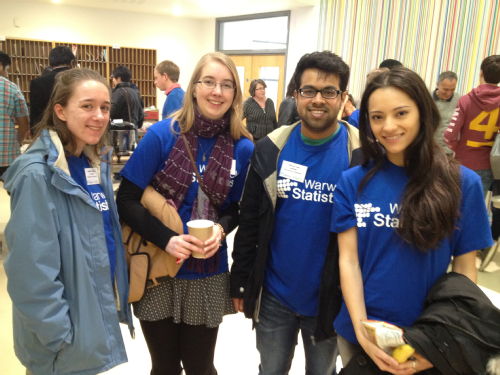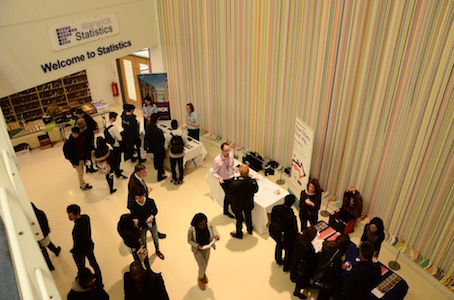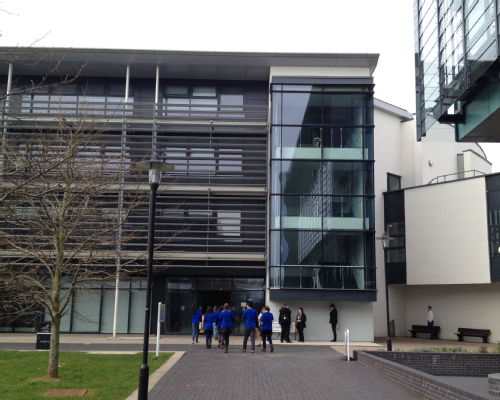Information for our Offer Holders
The information here relates to offer-holders for October 2019 entry.
Congratulations on receiving an offer to study at Warwick
This page contains information for applicants who have received an offer, or who have been recommended by the Department to receive an offer, to study for any of the Data Science, MathStat or MORSE degrees at Warwick.
The offer-holder visit days
 It was wonderful to talk with so many of our offer-holders at the Offer-Holder Visit Days on 18 and 19 March. Some questions and solutions from the lecture "How to Solve It" are here: Question 12 (STEP III 1998), Question 14 (STEP II 1999, including further comments on extensions of the question, applications and relationships to modules taught as part of our programs). Also see the Wikipedia page about the book How to Solve It by G. Polya.
It was wonderful to talk with so many of our offer-holders at the Offer-Holder Visit Days on 18 and 19 March. Some questions and solutions from the lecture "How to Solve It" are here: Question 12 (STEP III 1998), Question 14 (STEP II 1999, including further comments on extensions of the question, applications and relationships to modules taught as part of our programs). Also see the Wikipedia page about the book How to Solve It by G. Polya.
You are welcome to review the main talk: Risk and Predictability - Where Might Modern Mathematics Take Me? The full variety of research in our department is illustrated on individual staff's home pages. Warwick was recently been awarded Queen’s Anniversary Prize for its research in Mathematics and Statistics.
For offer-holders who did not make it to one of the Visit days, we are making some of the other material available here, too:
- Destination flyer Where do our Graduates Go?

- Brochure Warwick Statistics Research Spotlights
 (32MB - may take a little time to download).
(32MB - may take a little time to download).
If you have further questions, please do not hesitate to email Jessica Shuttleworth stats dot ug dot support at warwick dot ac dot uk;. University services represented at the Visit Days can also be contacted:
The next step: your decision
Deciding on your Firm and Insurance choices is a very important decision. We hope to help you to decide whether Warwick is the best place for your degree course. Our students are extremely important to the life of the Department; if you do come to study here, we want you to be sure that the choice you made was the right one for you. Below is information which may help you decide.
The course structure
Studying in one of our degree courses means following your passion for mathematical sciences and combining it with modern applications. The detailed course guides highlighting many aspects of the course organisation can be found here. You may also enjoy our Data Science video featuring Prof David Firth and Dr Sarah Wade and our Statistics video (about MORSE and MathStat) featuring Prof Saul Jacka.
Study experiencewarwick.ac.uk/stats/courses/studyexperience captures concrete aspects of studying for our degrees with statements of current students and a sample first year time table. More about learning of mathematical subjects can be found on the Study Advice page warwick.ac.uk/stats/courses/studying. CareersA summary of the excellent job prospects can be found at our website "Warwick Graduates in Demand!". Specific lists of possible careers can be found in our destinations flyer and a nice visualisation for MORSE careers can be found at the (external) website ALLABOUTCAREERS. Concrete examples of first jobs after graduation can be found at our Recent Alumni page. Consider our general leaflets: Data Science |
 |
Some frequently asked questions
Below are some of the questions we heard most during the offer-holder visit days in March. More admissions-related questions can be found at warwick.ac.uk/stats/courses/faq/.
How do you teach? There is a variety of formats including lectures and exercise classes for larger groups, and computer labs, supervisions and meetings with the personal tutor in smaller groups. A crucial part of learning happens through mathematical problem solving, which often preoccupies young minds wherever they are: walking around the lake, waiting at a bus stop or swimming their lanes. Many of our students form study groups and meet in the work areas around the department or in the library to discuss their work. A sample first year time table can be found at the Study Experience page. In later years, students will have an increasing amount of freedom with regard to module choices. They will also have the opportunity to work on a group project and a poster session. Students in our four-year degree devote about a quarter of their time in the final year to a research project supervised by one of our lecturers or professors. This includes giving a short oral presentation, presenting a poster and writing a dissertation.
What happens if I do not make the offer? Depending on by how much you missed it, how many spaces are left and many other factors you may or may not still be in. The single most important factor that may help you in this situation is a STEP or AEA paper result.
What if I do not do well on AEA/STEP? These papers can only boost your performance. If the results are not good they will be ignored.
What is the difference between maths at school and at university? Most of all it is a matter of volume and emphasis. A more detailed answer is on our Study Advice page.
Who can I ask if I do not understand the material taught? The most natural strategy is to ask questions in a supervision class, tutorial or lab. Teachers of smaller group sessions are usually grateful for questions, because it provides useful feedback about the students' progress. In addition, you can talk to the lecturer or to your personal tutor during office hours. And you can of course discuss the material with your fellow students.
Can I change between Data Science, MORSE, MathStats and the M-versions of the two latter ones? Yes. Changes between the 3 and 4 year versions of the MORSE and the MathStat degrees are possible up to the beginning of the third year. Changes between different degrees are possible until and on arrival in October and may be possible later subject to appropriate choice of modules.
How does MORSE differ from a Mathematics and Economics or Mathematics with Economics degree course? All of these are mathematically oriented degree courses with a strong bias towards interesting application areas. MORSE is uniquely distinctive in offering not only economic theory and the most relevant parts of university-level mathematics, but also the highly complimentary disciplines of Operational Research (often also called management science) and Statistics. The resulting combination of knowledge and skills puts MORSE graduates in an especially strong position on the job market. MORSE students in their final year (or the final two years of a 4-year course) can choose to emphasize strongly the mathematics and economics parts of the curriculum, if they so wish; or they may choose a different emphasis.
Can I do an internship? Many of our students do at least one internship. The most popular time is the summer after the second year. A decent number of them actually receive a job offer as a result, long before graduating. At the same time, an intership is an excellent opportunity to test in practice whether your career goal really matches your hopes and expectations. If that is not the case, you still have one or more years to optimise your module choices in view of different career goals. In the past, we have seen aspiring investment bankers going into computing, science or government statistics - and vice versa. The Careers Service is very supportive in helping to find promising opportunities and preparing for interviews. Two of our students describe their internship experiences in our March 2014 newsletter ![]() (see page 2 there).
(see page 2 there).
 |
STEP, AEA and our Entrance PrizesMathematics at university is more complex and more rigorous than mathematics at school. We recommend that you get a taste of this by obtaining more practice in mathematical problem solving. An excellent way to do so is to prepare for an AEA and/or for one of the STEP papers in Mathematics. Any time that you spend preparing for such papers will help you with the transition to university-level mathematics. At the same time, after having practised these harder questions, you should feel even more confident in answering standard A-level questions, thereby boosting your A-level performance. More about the motivation and practicalities regarding STEP and AEA can be found in our FAQ pages. In order to encourage you to take one of these examinations, we offer a £2000 prize to each 2019 entrant who achieves Grade S (Outstanding) in any of STEP I, STEP II or STEP III in 2019. For full details and the conditions see warwick.ac.uk/stats/courses/entrance-prizes. |
